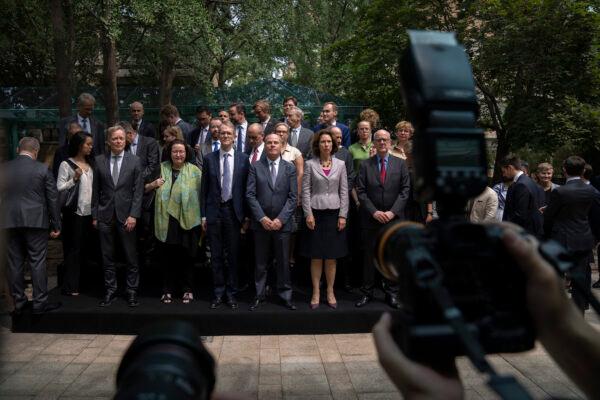A Chinese court convicted Canadian businessman Michael Spavor of espionage on Aug. 11, sentencing him to 11 years in prison, in a case widely seen as part of the Chinese regime’s pressure campaign against Canada over the arrest of Huawei Chief Financial Officer Meng Wanzhou.
The sentence came within a day of lawyers for Canada’s attorney general arguing in a Canadian court against a request to delay the extradition of Meng to the United States to face criminal charges.
Canadian Prime Minister Justin Trudeau called the conviction of Spavor “absolutely unacceptable and unjust.”
He said that Spavor and another Canadian, former diplomat Michael Kovrig, were “arbitrarily detained” by the Chinese regime and that the Canadian government continues to prioritize securing their immediate release.
“We will continue working around the clock to bring them home as soon as possible,” Trudeau said. “We will not rest until they are safely brought home.”
“While we disagree with the charges, we realize that this is the next step in the process to bring Michael home, and we will continue to support him through this challenging time,” the Spavor family said.
“This decision is rendered after a legal process that lacked both fairness and transparency, including a trial that did not satisfy the minimum standards required by international law,” he said.
Canadian Ambassador to China Dominic Barton attended Spavor’s hearing in Dandong on Aug. 11, while a news conference at the Canadian Embassy in Beijing was attended by representatives from 25 countries in a show of support. The countries included the United States, Australia, New Zealand, Japan, Germany, France, the EU, Italy, and Sweden.

“Within 24 hrs, #China legal system has shown that it is anything but independent. After a death penalty against #Schellenberg now #MichaelSpavor sentenced to 11 years in prison for phony spying charges,” Dalphond wrote.
One Day Trial
Spavor was previously charged with espionage in June 2019. The Dandong court concluded a one-day trial in March and waited until Aug. 11 to announce its verdict.Spavor’s family previously said in March that the charges against him are vague and haven’t been made public and that he has had “very limited access and interaction with his retained Chinese defense counsel.”
His sentencing comes as a Canadian court is set to hear final arguments and decide whether to extradite Huawei CFO Meng to face U.S. criminal charges.
She’s accused of misleading HSBC about Huawei’s business dealings in Iran, a move that put HSBC at risk of violating U.S. trade sanctions against Iran. Both Meng and Huawei have denied the charges. Lawyers in Canada representing Meng have sought to convince the court to not extradite her.

Huawei executive Meng Wanzhou arrives at the B.C. Supreme Court in Vancouver, Canada, on Aug. 9, 2021. The Canadian Press/Darryl Dyck
Meng was arrested at Vancouver International Airport at the request of the United States on Dec. 1, 2018.
Spavor and Kovrig were later arrested by Chinese authorities on Dec. 10, 2018. The two Michaels’ detention were widely seen as retaliation by the Chinese regime for Meng’s arrest.
The Chinese regime has denied a direct connection between Meng’s case and the two Michaels’ cases, but Chinese officials and media have repeatedly called for Meng’s immediate release while mentioning the fates of the two men.
Kovrig’s trial concluded in March. His verdict is set to be announced at an unspecified date.
China has a conviction rate of more than 99 percent, and public and media access to trials in sensitive cases are typically limited.
Meng remains out on bail under house arrest in Vancouver. Her extradition hearing is expected to wrap up by Aug. 20. A ruling from the judge is expected in the next few months, after which Canada’s justice minister will decide whether to extradite her.
The Australian government said on Aug. 11 that it “stands with Canada” in response to Spavor’s arbitrary detention and to the upholding of Schellenberg’s death penalty.





